HVAC Companies Faringdon
Find top Heating and Cooling Services in Faringdon
Get multiple HVAC Services quotes for your project today! Compare profiles, reviews, accreditations, portfolio, etc... and choose the best service.

AD Heating Solutions Ltd
4.751 reviewsUnit 7 Oddington Grange, OX25 3 QW, GBAD Heating Solutions is owned and managed by Daniel Eadle. With a focus on safety and customer service, AD Heating Solutions ensure that customers get great value for money without compromising on quality. Our mission is to revolutionise and innovate the services we provide, within all aspects of the heating industry. We will utilise, and embrace, all aspects of the latest technology available, within the realms of existing fossil fuels, sustainable, and renewable sources. We will provide tailor made, and bespoke solutions in the most efficient, cost effective, ways possible. We will ensure that optimum customer experience is maintained at the highest levels, at all times. We are driven by excellence, ingenuity, and conscientiousness. AD Heating Solutions 944937 are an introducer appointed representative of Koze Group Ltd, a credit broker not a lender. Koze Group Ltd are authorised and regulated by the Financial Conduct Authority (FRN 811281) registered in England (08357963). We offer finance products from a panel of lenders. Credit subject to age and status.
- Services
- Why Us?
- Our Team
- Gallery
Get Quote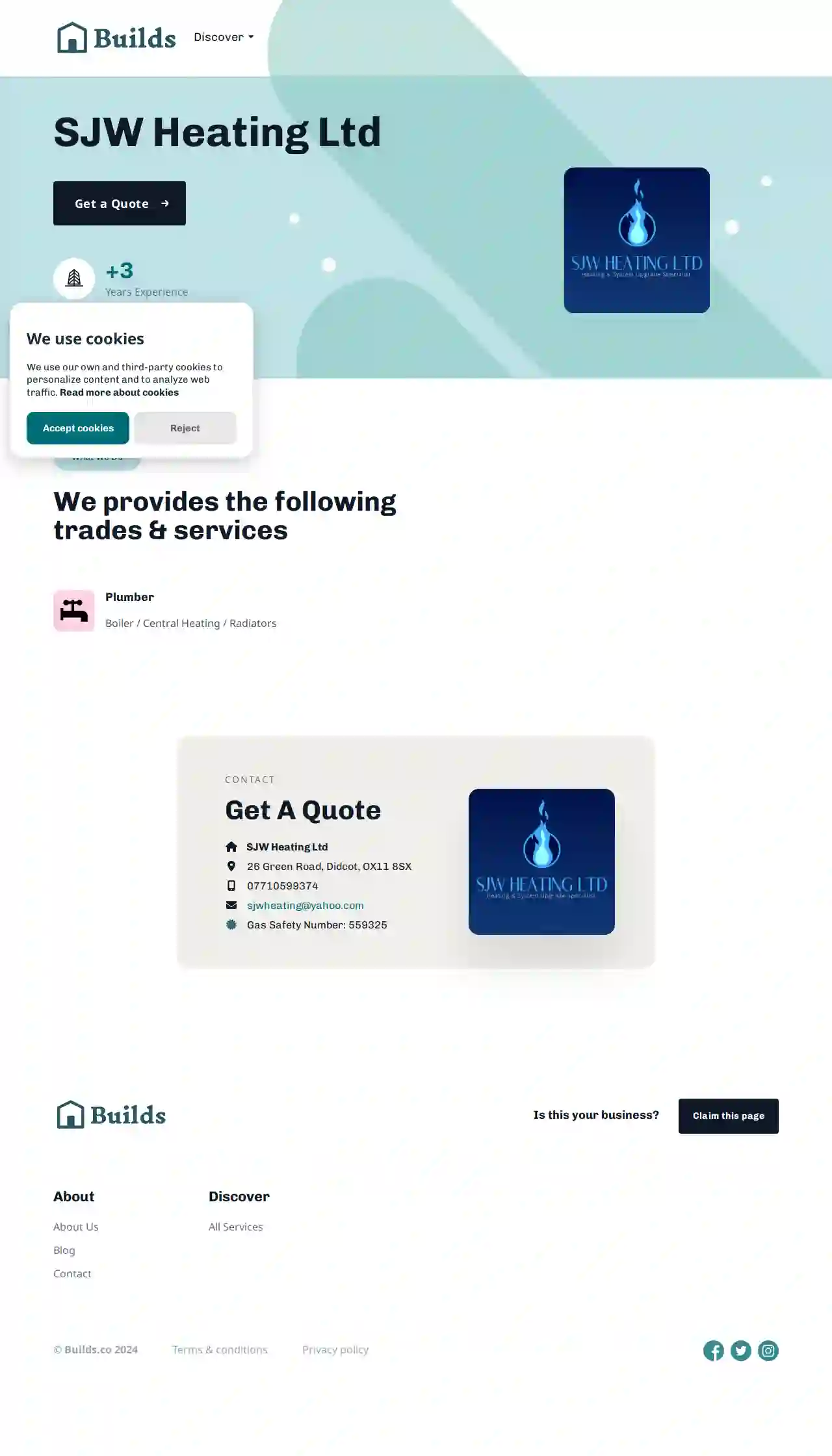
SJW Heating Ltd
26 Green Road, Didcot, OX11 8SX, GBAt Builds.co, we are a reliable online job market for local and highly-skilled construction tradesmen. We connect homeowners in need to the skilled tradesperson who's capable of doing the job in the most stress-free way possible. Our mission is to make it almost instant for homeowners to find the right expert and access a pool of highly-skilled tradespeople who specialise in their specific need. For skilled tradespeople, we aim to become the leading tradesman job market who will be your springboard to starting and building your own tradesmen business. We provide a peace of mind solution for homeowners, knowing their home is in good hands with our trusted tradespeople.
- Services
- Why Us?
- Gallery
Get Quote
Wallingford Heating
Wallingford Heating, 131 Brasenose Rd, Didcot, OX11 7BP, GBWallingford Heating & Plumbing is a local plumbing and heating services provider in Wallingford and the surrounding areas. As fully accredited Gas Safe engineers, we work with you to provide a solution that works. Our team of experts provides high-quality installations, prompt plumbing and heating services, and emergency repairs. We care about our customers, which is why we always work to deliver top quality workmanship with little fuss.
- Services
- Why Us?
- Gallery
Get Quote
Oxyplumb Heating & Air Conditioning Engineers
4.9211 reviews123 Main St, Witney, OX28 4XG, GBWelcome to [Boiler Installation Company], your trusted partner for all your boiler installation, repair, and maintenance needs. With years of experience and a team of Gas Safe and OFTEC registered engineers, we provide top-notch services to ensure your boiler is working efficiently and safely. Our services include gas and LPG boiler installation, oil boiler installation, boiler repairs, and boiler service. We also offer finance options to help you spread the cost of a new boiler. Contact us today to learn more about our services and how we can help you.
- Services
- Why Us?
- Accreditations
- Gallery
Get Quote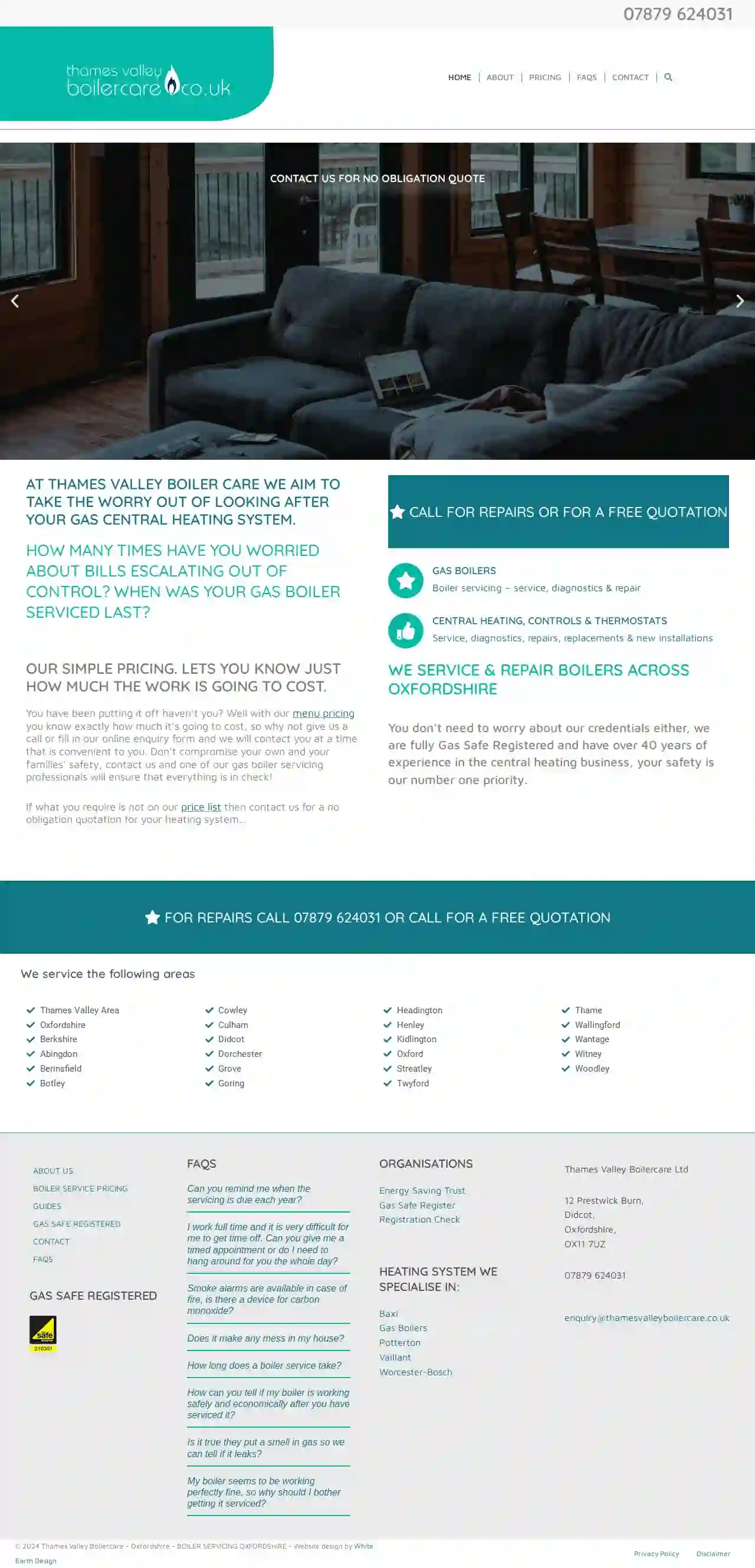
Thames Valley Boilercare Limited
4.826 reviews12 Prestwick Burn, Didcot, OX11 7UZ, GBThames Valley Boilercare is a Gas Safe Registered company with over 40 years of experience in the central heating business. We provide boiler servicing, diagnostics, repairs, replacements, and new installations across Oxfordshire. Our team of professionals prioritizes your safety and offers a simple menu pricing structure for transparency. We service various areas, including Abingdon, Berinsfield, Botley, Cowley, Culham, Didcot, Dorchester, Grove, Goring, Headington, Henley, Kidlington, Oxford, Streatley, Twyford, Thame, Wallingford, Wantage, Witney, and Woodley. We specialize in Baxi, Gas Boilers, Potterton, Vaillant, and Worcester-Bosch heating systems.
- Services
- Why Us?
- Accreditations
- Gallery
Get Quote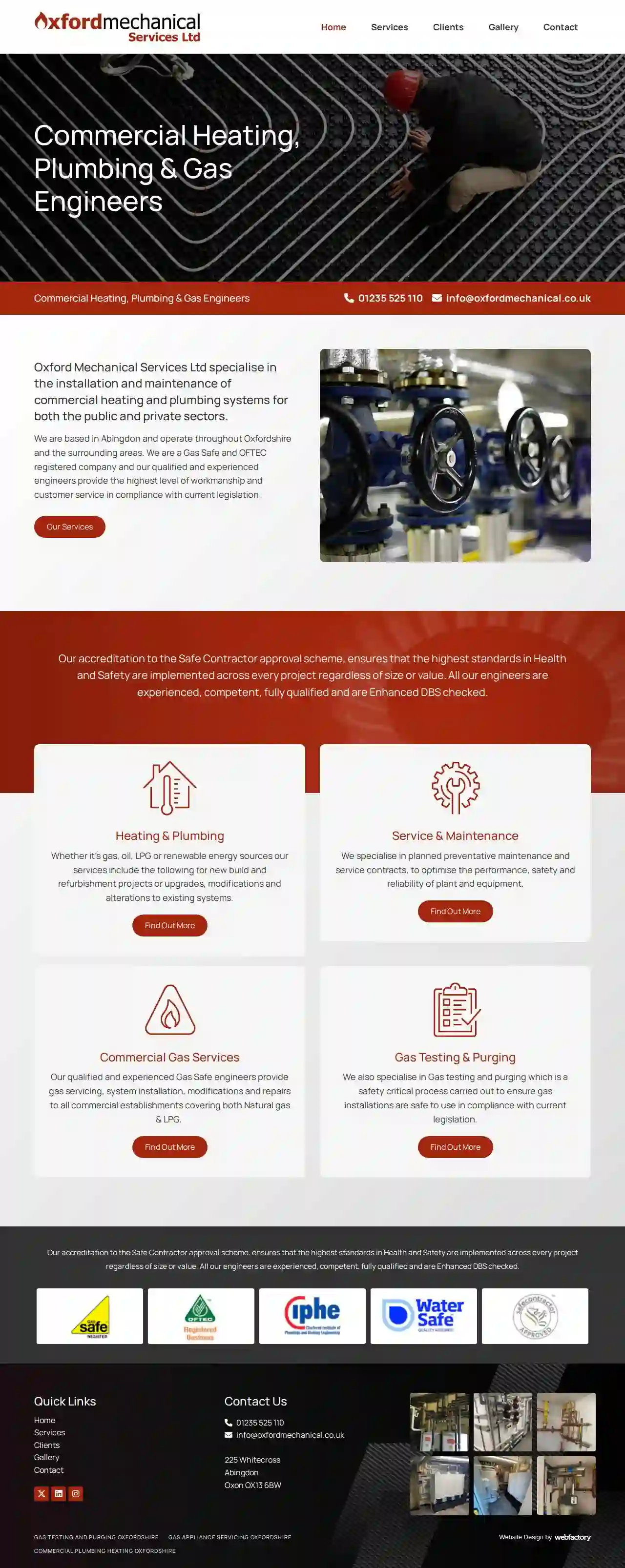
Oxford Mechanical Services Ltd
225 Whitecross, Abingdon, OX13 6BW, GBOxford Mechanical Services Ltd specialise in the installation and maintenance of commercial heating and plumbing systems for both the public and private sectors. We are based in Abingdon and operate throughout Oxfordshire and the surrounding areas. We are a Gas Safe and OFTEC registered company and our qualified and experienced engineers provide the highest level of workmanship and customer service in compliance with current legislation. Our accreditation to the Safe Contractor approval scheme, ensures that the highest standards in Health and Safety are implemented across every project regardless of size or value. All our engineers are experienced, competent, fully qualified and are Enhanced DBS checked.
- Services
- Why Us?
- Accreditations
- Gallery
Get Quote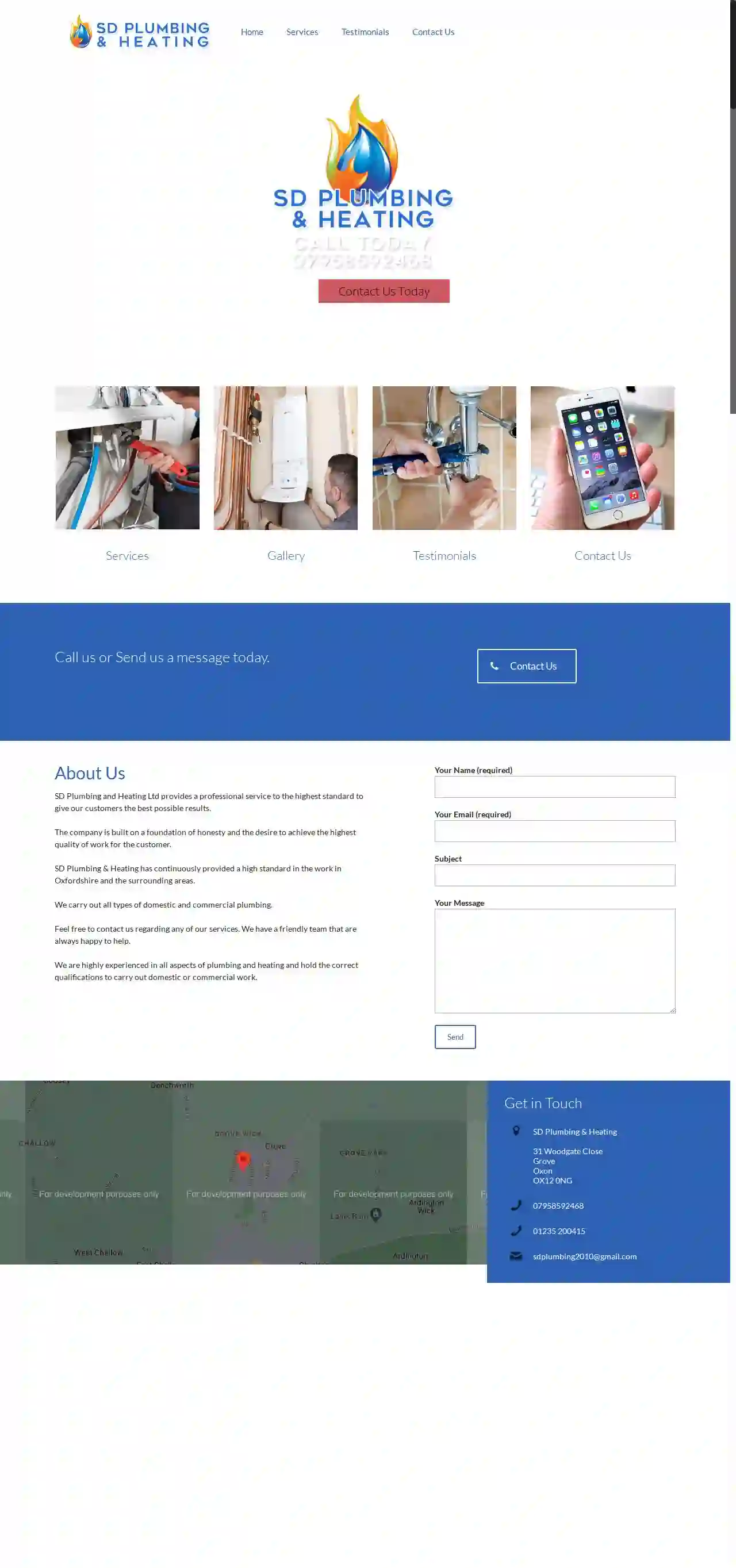
S D Plumbing & Heating
4.47 reviewsGrove, 31 Woodgate Close, OX12 0NG, GBSD Plumbing & Heating Ltd provides a professional service to the highest standard to give our customers the best possible results. The company is built on a foundation of honesty and the desire to achieve the highest quality of work for the customer. SD Plumbing & Heating has continuously provided a high standard in the work in Oxfordshire and the surrounding areas. We carry out all types of domestic and commercial plumbing. Feel free to contact us regarding any of our services. We have a friendly team that are always happy to help. We are highly experienced in all aspects of plumbing and heating and hold the correct qualifications to carry out domestic or commercial work.
- Services
- Why Us?
- Accreditations
- Our Team
- Testimonials
- Gallery
Get Quote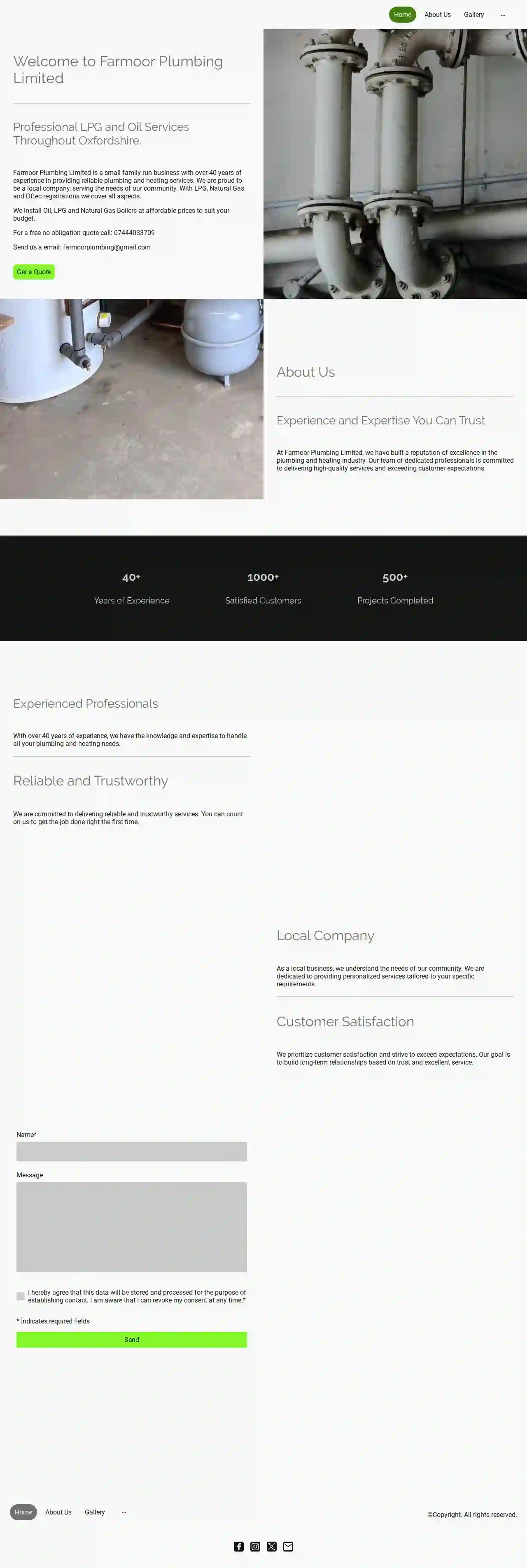
Farmoor Plumbing Limited
55 reviewsOxford, GBWelcome to Farmoor Plumbing Limited, a small family-run business with over 40 years of experience in providing reliable plumbing and heating services throughout Oxfordshire. We take pride in being a local company, dedicated to serving the needs of our community. With our LPG, Natural Gas, and Oftec registrations, we cover all aspects of your plumbing and heating requirements. We install Oil, LPG, and Natural Gas Boilers at affordable prices to suit your budget. For a free, no-obligation quote, call us at 07444033709 or send an email to [email protected]. At Farmoor Plumbing Limited, we have built a reputation for excellence in the plumbing and heating industry. Our team of dedicated professionals is committed to delivering high-quality services and exceeding customer expectations. With over 40 years of experience, we possess the knowledge and expertise to handle all your plumbing and heating needs. We are committed to providing reliable and trustworthy services, ensuring the job is done right the first time. As a local business, we understand the unique needs of our community and strive to provide personalized services tailored to your specific requirements. Customer satisfaction is our top priority, and we aim to build long-term relationships based on trust and exceptional service.
- Services
- Why Us?
- Gallery
Get Quote
HeatView Emergency Plumber/Boiler Repair Bicester
53 reviews53 Orchard Way, Bicester, OX26 2EL, GBHeatView Emergency Plumber/Boiler Repair Bicester is a family run plumbing business, providing Bicester area with a friendly professional service for all your plumbing and boiler repair requirements.Our 24 hour emergency plumber Bicester. We specialize in all types of Plumbing services including Emergency Plumbing call outs, Boiler Repair, Boiler installation, Boiler servicing and full heating installations. HeatView Emergency Plumber/Boiler Repair Bicester pride ourselves as being one of the area’s premier 24 hour emergency Plumbing companies. When a problem occurs that requires an immediate response we offer complete solutions including Boiler repairs and waterleak repairs throughout Bicester 24 hours a day, 365 days a year. Highly skilled local Plumbers are on standby with fully equipped vans containing all the necessary equipment to carry out any Plumbing service. With our local Bicester engineers you know you’re in safe hands. We have had many recommendations through word of mouth. This is due to our policy of putting customer satisfaction as well as safety, above all else. Please contact one of are friendly office staff now to book a appointment.
- Services
- Why Us?
- Gallery
Get Quote
Saker Controls Ltd
Unit 30, 9 Waterberry Drive, Waterlooville, PO7 7TH, GBSaker Controls Ltd is a leading independent BEMS systems integrator with considerable experience in delivering BEMS and Energy Services to clients across all sectors throughout the UK. Established in 2000, Saker Controls is committed to providing value-driven smart control solutions that optimize existing installations with selected upgrades and emerging technologies. Our smart solutions help businesses operate efficiently, reduce energy costs and carbon emissions, enable more informed decision-making, improve control, and reduce business risk. We provide 24/7/365 project installations, support services, and integrated energy management solutions to businesses across the UK, with offices in Waterlooville (Head Office), Bicester, and Glasgow.
- Services
- Why Us?
- Accreditations
- Our Team
- Testimonials
- Gallery
Get Quote
Over 12,692+ HVAC Businesses registered
Our HVAC pros operate in Faringdon and surroundings!
HVACCompaniesHub has curated and vetted Top HVAC Businesses arround Faringdon. Find a top & reliable contractor today.
Frequently Asked Questions About HVAC Companies
- What is the source of the problem? Get a clear explanation of the issue and what caused it.
- What are my repair options? Discuss different repair solutions, if applicable, and their associated costs.
- Are there any preventative measures I can take? Find out if there are steps you can take to prevent future problems.
- Do you recommend a repair or replacement? If repairs are extensive or the system is old, consider replacement.
- What are the warranties on parts and labor? Understand the warranties before agreeing to any repairs.
- Do you have any customer reviews or testimonials I can check? Reputable HVAC technicians are often happy to provide references or direct you to customer reviews.
- Check Online Reviews: Look for HVAC companies with positive reviews and high ratings on platforms like Google, Yelp, and others.
- Ask for Referrals: Reach out to friends, family, neighbors, or colleagues for recommendations.
- Verify Licensing and Insurance: Ensure the company is properly licensed and insured to operate in your area.
- Look for Certifications: Check for certifications from reputable organizations like NATE (North American Technician Excellence).
- Compare Quotes: Get quotes from multiple HVAC companies to compare pricing and services.
- Use a Directory like HVACCompaniesHub: Simplify your search by using our directory of pre-screened and qualified HVAC professionals.
- AC not cooling: Refrigerant leaks, compressor issues, or thermostat problems.
- Furnace not heating: Pilot light or ignition control issues, blower motor problems, or clogged filters.
- Uneven temperatures: Ductwork leaks, inadequate insulation, or faulty thermostats.
- Poor air quality: Dirty air filters, mold growth in ductwork, or inadequate ventilation.
- Strange noises: Unusual sounds from the system can indicate a variety of problems with different components.
- High energy bills: Inefficient systems, ductwork leaks, or improper thermostat settings.
- Reduced Airflow: Noticeably weaker airflow from your vents.
- Dusty Vents: Dust accumulation around your vents.
- Increased Dust: More dust than usual in your home.
- Allergies or Respiratory Issues: Worsening allergy symptoms or respiratory problems.
- Higher Energy Bills: Your furnace becomes less efficient.
- Overheating: The system overheats due to restricted airflow.
What should I ask an HVAC technician during a service call?
How do I find a good HVAC company near me?
Finding a reputable HVAC company requires research. Consider these tips:
What are the most common HVAC problems?
Common HVAC problems include:
How can I tell if my furnace filter needs changing?
What should I ask an HVAC technician during a service call?
- What is the source of the problem? Get a clear explanation of the issue and what caused it.
- What are my repair options? Discuss different repair solutions, if applicable, and their associated costs.
- Are there any preventative measures I can take? Find out if there are steps you can take to prevent future problems.
- Do you recommend a repair or replacement? If repairs are extensive or the system is old, consider replacement.
- What are the warranties on parts and labor? Understand the warranties before agreeing to any repairs.
- Do you have any customer reviews or testimonials I can check? Reputable HVAC technicians are often happy to provide references or direct you to customer reviews.
How do I find a good HVAC company near me?
Finding a reputable HVAC company requires research. Consider these tips:
- Check Online Reviews: Look for HVAC companies with positive reviews and high ratings on platforms like Google, Yelp, and others.
- Ask for Referrals: Reach out to friends, family, neighbors, or colleagues for recommendations.
- Verify Licensing and Insurance: Ensure the company is properly licensed and insured to operate in your area.
- Look for Certifications: Check for certifications from reputable organizations like NATE (North American Technician Excellence).
- Compare Quotes: Get quotes from multiple HVAC companies to compare pricing and services.
- Use a Directory like HVACCompaniesHub: Simplify your search by using our directory of pre-screened and qualified HVAC professionals.
What are the most common HVAC problems?
Common HVAC problems include:
- AC not cooling: Refrigerant leaks, compressor issues, or thermostat problems.
- Furnace not heating: Pilot light or ignition control issues, blower motor problems, or clogged filters.
- Uneven temperatures: Ductwork leaks, inadequate insulation, or faulty thermostats.
- Poor air quality: Dirty air filters, mold growth in ductwork, or inadequate ventilation.
- Strange noises: Unusual sounds from the system can indicate a variety of problems with different components.
- High energy bills: Inefficient systems, ductwork leaks, or improper thermostat settings.
How can I tell if my furnace filter needs changing?
- Reduced Airflow: Noticeably weaker airflow from your vents.
- Dusty Vents: Dust accumulation around your vents.
- Increased Dust: More dust than usual in your home.
- Allergies or Respiratory Issues: Worsening allergy symptoms or respiratory problems.
- Higher Energy Bills: Your furnace becomes less efficient.
- Overheating: The system overheats due to restricted airflow.